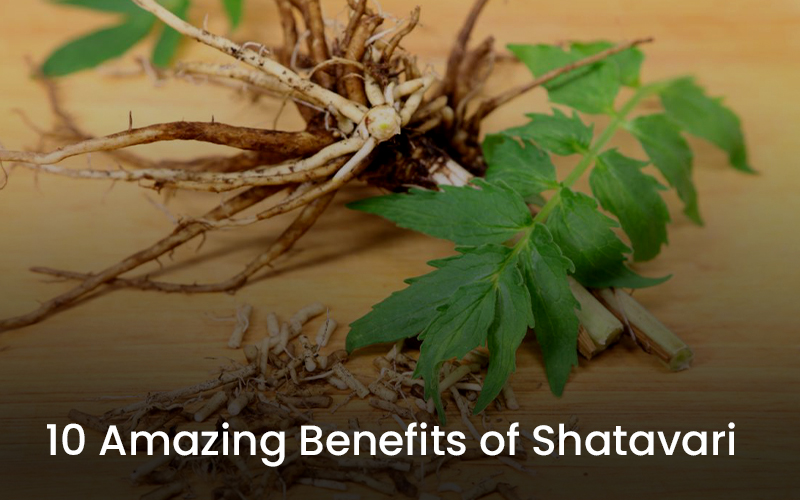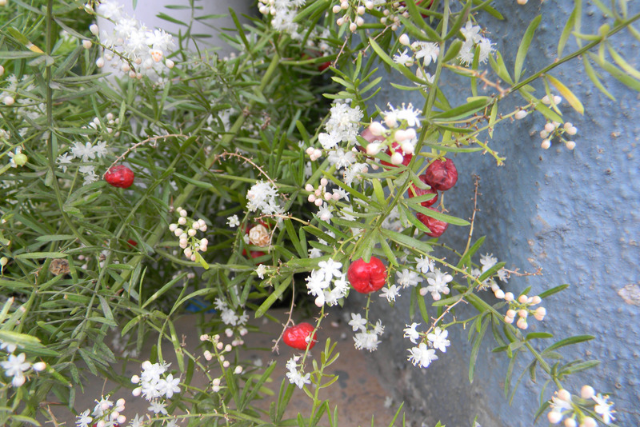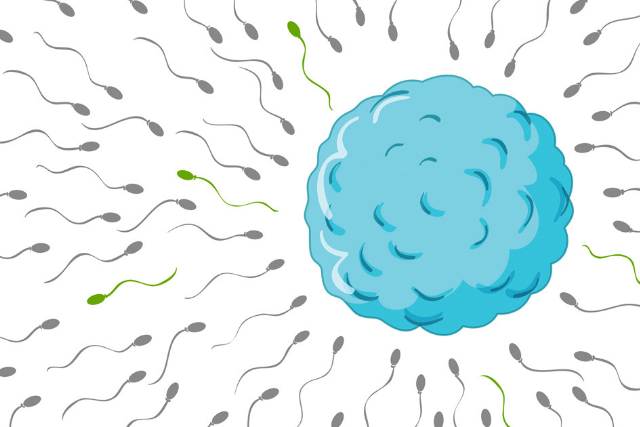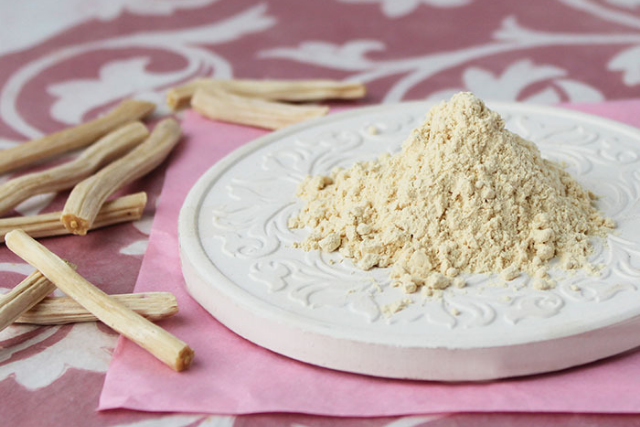10 Amazing Benefits of Shatavari and How It Is Used

Ayurveda is a medicinal system that has been around for centuries and millennia now and yet stays relevant in the modern world. The main potency of this ancient medicinal system lies in the ideal lifestyle practices it preaches to promote the mental, physical, and spiritual wellbeing of human beings. When we speak of this ideal lifestyle, the idea of consuming herbs for well-being comes about. While there exist hundreds of herbs boasting their benefits in this vast medicinal system – there is an herb called “Shatavari” that stands out for use, especially in women. It is often called the “Queen Of Herbs” because of its renowned health benefits related to female physiology. Others call this herb an aphrodisiac because of its proclaimed benefits for the reproductive system and libido.
Sounds all fascinating, doesn’t it? A God-given herb that seems to exist to promote the wellbeing of young women. What has modern science got to say about this? How do medicinal experts today explain the fantastic health benefits of Shatavari? And how can you use it for your gain? These are some of the many questions we will explore in this blog.
What is Shatavari?

The word “Shatavari” is derived from the Sanskrit words “Shat” which means “hundred” and “Var” which means “husbands”. Combining these words, “Shatavari” literally translates in English to “one who has a hundred husbands”. This name has been intentionally given to this herb because of its aphrodisiac-like benefits for women. Ayurveda has traditionally used this herb as a Rasayana for menstruating women and lactating mothers. It was believed to relieve adverse symptoms for women going through menopause and promote the health of menstruating women. This array of female-centric uses of Shatavari has given it the popular name of the “female tonic” amongst Ayurvedic practitioners.
Botanically speaking, the Shatavari plant comes from the family of asparagus. Its scientific name is Asparagus Racemus. This plant grows in parts of India, near the Himalayas, some regions in China, and across the oceans in some parts of Australia. Over the past few decades, a rise in the esteem of Ayurvedic treatments has been seen which has made this herb beloved in the west. This has led to an amount of research on the plant. As is the case for many Ayurvedic herbs, medical experts classify Shatavari as an adaptogen. Adaptogens refer to herbs that may help your body deal with physical as well as mental stress. These herbs are not the direct treatment for diseases but can play a role in preventing them and promoting health resilience.
10 of The Amazing Benefits Of Shatavari
Traditionally, Shatavari was believed to be the Queen of Herbs appropriate for the usage of women. Now that the current age of modern science has gained an interest in Ayurvedic medicine, more and more research has come about regarding the versatile usage of Shatavari. Not only has this strengthened the long-living claims made by Ayurveda, but it has added to the range of benefits Shatavari can have for all of us. No longer does the usage surround just women – the herb proves to have benefits for a plethora of health issues, including men’s reproductive health. Read on to know 10 of the most amazing benefits of our favorite polyandrous Queen of herbs!
Promotes Female Reproductive Health

This is the most renowned benefit associated with the use of Shatavari. When we speak about female reproductive health – we refer to a set of different issues associated with menstrual cycles, female sex hormones, fertility, and more. Several proven characteristics within Shatavari make it useful for the wide array of physiological areas we just mentioned. Let us walk through them point by point for a better understanding:
For Hormonal Imbalance And PCOS –
- Some studies in the past decade have explained that Shatavari is composed of phytoestrogens – which refer to plant compounds that are chemically structured in the same way that ovarian estrogen is structured. You might be well aware that estrogen refers to the female sex hormone and plays a significant role in regulating libido, menstruation, and ovulation in women.
- The presence of phytoestrogens in Shatavari is the reason that it can effectively be used to treat hormonal imbalances surrounding estrogen. By boosting estrogen, Shatavari can lead to enhanced libido and a higher chance of conception for women who are trying. The herb, therefore, proves to be a natural aphrodisiac.
- Polycystic Ovarian Syndrome or PCOS is a condition that occurs in women when their body produces too many androgens (male sex hormones) and not enough estrogen. Recent studies have shown that consuming Shatavari can help reduce the distressing symptoms of PCOS as it may cause a rise in estrogen levels in the body. This is not to say that the herb is an appropriate treatment for a serious disorder such as PCOS, but it indicates that Shatavari can help with some PCOS symptoms.
For Lactating Mothers:
The herb of Shatavari has traditionally been used as a tonic for lactating mothers because Ayurvedic medicine believed that the herb can increase the production of milk by the mammary glands. Surely enough, some studies have found that the herb composes a substance called galactagogue, which can enhance lactation in mothers. However, we advise you to always talk to your doctor first before taking an unknown herbal supplement. This especially applies to the post-natal body which is vulnerable to adverse effects caused by foreign ingredients.
Promotes Male Reproductive Health

We know that we have been speaking in detail about how much Shatavari has in store for women, but as it turns out, research has shown that the herb is good for the male reproductive system too! Shatavari powder, made by the root of the Shatavari plant, may act as a spermatogenic which enables enhanced sperm production. The herb is also associated with increasing fertility and libido in men, thanks to its soothing effect on the body that reduces anxiety and stress (chief causes that can lead to erectile dysfunctions).
Boosts Immune System

Ayurveda calls Shatavari a “Rasayana”. This is a term dedicated to herbs that promote physiological wellbeing by improving the mental and physical resilience of the body. In other words, they make your body more immune to stressors. Medical science denotes such herbs as adaptogens, which essentially act as a immunity booster. Studies show that the queen of herbs is a great anti-oxidant, which enables it to fight infection-causing cells caused by “free radicals”.
A substance called “sapogenin” is also found in Shatavari. Sapogenins are compounds that maintain healthy body temperature and increase resistance against stress. This implies that Shatavari can help you fight a fever, assist you when your body is under stress, and aid your immune system to speed up your recovery from illnesses!
Clears Cough
Acting as a cold remedy is an age-old use of Shatavari’s root juice. In fact, this herb is believed to be a one-stop for all kinds of respiratory problems – whether it’s cough, flu, or a fever. The herb has antibiotic, anti-inflammatory, and anti-asthmatic characteristics to thank for the same. These claims were tested in a recent study done on mice and proved to be somewhat true. The cough clearing effects on the mice upon the dosage of Shatavari were comparable to a prescription cold remedy!
Additionally, Shatavari is also effective in clearing your lungs of phlegm. This can help you out if you often have breathing problems, sleep apnea, or general lung-related problems.
Can Alleviate Mental Health
Shatavari has a soothing effect on physiology which makes it naturally effective in reducing the symptoms accompanied by stress and anxiety. Ayurveda used the herb originally to promote mental wellbeing and reduce stress. Some ayurvedic scholars even claimed that the herb can improve memory and concentration.
Current studies have shown that Shatavari has certain substances such as flavonoids and saponins that may combat the effect of stress on the body. Furthermore, a study with the herb conducted on rats indicated that Shatavari interacts with important neurotransmitters namely serotonin and GABA, both of which are chemicals that play a vital role in regulating one’s mood and mental health. This poses a strong indication that Shatavari can indeed have anti-depressive and anti-anxiety effects upon consumption.
Aids With PMS and Menopause Symptoms
PMS and menopause have tons in common, and not just in terms of the symptoms they exhibit: both these conditions mark a significant stage in the menstrual cycle. While menopause is obviously a bigger milestone, both these conditions are characterized by a drop in estrogen levels, devastating effects on the mood, lower levels of serotonin, irritability, and anxiety. It may also be accompanied by cramps.
Shatavari, along with being rich in phytoestrogens, is also a great anti-inflammatory. This enables it to reduce pain and discomfort during your menstrual cycle. The rise in estrogen levels caused by the herb helps reduce symptoms such as low libido and irritability. Furthermore, studies have proven that Shatavari is a mood enhancer (as mentioned in the previous section). Considering that depression and other mood disturbances are key symptoms that women have to deal with during PMS and menopause, this herb comes to you as a blessing that has the resolve to all your uterus woes!
Promotes Healthy Digestion
Shatavari is popularly used as a home remedy to treat diarrhea and dysentery. Diarrhea is a condition where you pass fecal matter with little to no fiber and a lot of liquified matter. A key symptom and adverse effect of diarrhea is dehydration. Shatavari is rich in flavonoids and fiber that can help treat diarrhea. Further, it reduces fluid retention from excretion, which saves your body a lot of hydration and electrolytes.
The herb Shatavari has also proven to be effective in treating ulcers that may occur in one’s food pipes, stomach, and intestines. Ulcers can often be formed by either gastrointestinal malfunction or stress. The effect of Shatavari was sufficiently noted in gastric issues induced ulcers. In fact, a study on rats showed that its effects were equivalent to ranitidine, which is a drug prescribed for gastric issues. Therefore, Shatavari can enable healthy digestion in your system by treating ulcers, diarrhea, and preventing dehydration. That is certainly a lot of hassle avoided!
May Treat Hypertension

Hypertension or High blood pressure is one of the most common health issues faced by humans and is on the rise with our stressful lifestyles. Research shows that Shatavari can help this condition by acting as a diuretic.
Diuretics refer to any substance that helps your body get rid of excess sodium and fluid (they are also called water pills). You see, when your body has too much sodium, it holds more water, which causes both blood-thinning and hypertension. By consuming Shatavari and getting rid of the excess sodium in your system your blood pressure can be effectively balanced.
May Help With Diabetes
Diabetes and blood sugar problems are another deadly set of conditions that seem to be on the rise over the years. It is unclear how, but a study in 2007 found a relationship between the consumption of Shatavari with enhanced insulin secretion.
Insulin is the hormone that digests sugars in your body and a deficiency of which causes Type 2 diabetes. By affecting the insulin secretion in your body, the herb directly improves the blood sugar levels in your body. Future research might be able to figure out exactly what substance present in the herb causes this effect, which might hold great significance in medicine.
Shatavari For Skin & Hair
Though Shatavari may not directly impact your skin and hair, there are several characteristics in the herb that could work wonders for both your skin and hair! Shatavari is highly anti-oxidant – therefore it can keep your cells away from damage and slow the adverse effects of aging. This includes skin and hair cells. In other words, regular consumption of Shatavari might help you prevent wrinkles, and even prevent collagen damage. This means smooth, wrinkle-free, tight skin for years to come!
Shatavari, as discussed before, is also an amazing hormone balancer. This can be helpful particularly for people with oily skin and acne since androgens are often associated with excess oil production. Additionally, the anti-stress effects of Shatavari may save you a ton of weight gain caused by excessive stress.
How To Use Shatavari – the Queen of Herbs?

Traditionally speaking, Ayurveda always used Shatavari in the form of a powder. This powder was made using the roots of the Shatavari plant and consumed as an ingredient in several folk remedies. Currently, thanks to the growing popularity of the herb in the modern world – Shatavari is available in several different forms such as capsules, tablets, and a liquid extract.
There is no official recommendation on the consumption of Shatavari, due to limited knowledge. However, here are some common ways the different forms of supplementary Shatavari are consumed:
- If you are using Shatavari in powder form, there is an endless number of ways you can consume it. Traditionally, people liked to mix it with milk, ghee, and honey. Some even added the herb to the ghee they used for cooking so that they could consume it every time they consumed ghee. A nuanced way of consuming Shatavari is adding the powder to water and drinking it as herbal tea. This tea should ideally be consumed 1-2 times a day. Only 1-2 teaspoons of Shatavari should be used per cup.
- The tablet form of Shatavari usually consists of a 500mg dose per unit. These tablets can be consumed once or twice a day, according to one’s preferences and needs.
- A liquified form of Shatavari makes its appearance in markets as diluted juice from the roots of the plant. These can be either added to a drink or consumed in drops on their own, twice or thrice a day.
It would be wiser to consult a physician, or an Ayurvedic doctor before deciding to get on these supplements. Professionals will be able to guide you on what brands to choose, and what doses are reasonable.
Things To Keep In Mind Before Using Shatavari
- Shatavari is not known to have any severe health hazards or side effects. Ayurvedic medicine considers Shatavari absolutely safe for all conditions, as one of the traditional uses of the herb was to aid lactation for mothers with newborns. However, there is not much medical research on whether or not it is safe for pregnant and lactating women to use. Use the supplement at your own risk.
- Shatavari is effective in lowering blood sugar levels. Overconsumption of the herb may therefore lead to very low blood sugar levels causing tiredness, palpitations, and dizziness.
- Do not use Shatavari if you have an allergic reaction to asparagus. Consult a doctor immediately if upon consumption you experience any dizziness, increased heart rate, itchiness, or rashes.
- If you are diabetic and are taking supplement diuretics in your treatment, do not use Shatavari. The herb itself acts as a diuretic and the two substances may magnify effects on your body more than what is healthy and safe.
The Takeaways
Shatavari, an herb being used in Ayurvedic medicine for 3000 years, has caught the eye of modern medicine and proven to be effective in what it claimed to do. Not only does the consumption of this herb balance sex hormones in your body, but it resolves stomach issues, keeps your intestines clean, reduces hypertension, treats cold allergies, and can even help with Type 2 diabetes!
However, it is important to be careful before using any new supplement for your physiology. Though the herb is generally safe to use overconsuming it might lead to severe consequences. Therefore, treat your body like your own little kingdom and invest in our royal Queen of herbs wisely and mindfully, just like a sensible queen would.










